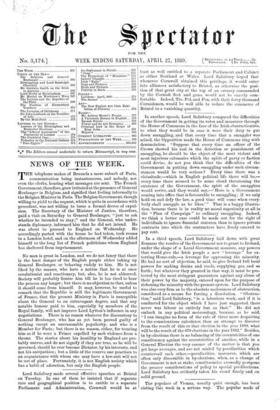In a third speech, Lord Salisbury laid down with great
firmness the resolve of the Government not to grant to Ireland, under the shape of a Local Government measure, any powers that would give the Irish people a new " leverage " for ex- torting Home-rule,--a leverage for oppressing the minority. He had no sort of objection, he said, to give Ireland full local powers for making drains and roads, supplying gas, and so forth ; but whatever they granted in that way, it must be pro- tected by the most stringent guarantees against any abuse of their power by the majority, entered upon for the purpose of sickening the minority with the present system. Lord Salisbury was also very firm as to the absolute uselessness of obstruction, considered as a means for forcing a dissolution. " Obstruc- tion," said Lord Salisbury, " is a laborious work, and if it is conducted for the object which I have just suggested, there never was labour so entirely lost as that." He did not embark in any political meteorology, because, as he said, "1 can imagine no form of the rule of three more despairing to the conscientious calculator, than an attempt to discover from the result of this or that election in the year 1889, what will be the result of the 670 elections in the year 1892." Besides, in by-elections there is no balancing of the eccentricities of one constituency against the eccentricities of another, while in a General Election the very essence of the matter is that you get large averages, and are not misled by peculiarities which countervail each other,—peculiarities, moreover, which are often only discernible in by-elections, when, as a change of Government is not at stake, constituencies avowedly postpone the greater considerations of policy to special predilections. Lord Salisbury has evidently taken his stand firmly and on solid ground.


































